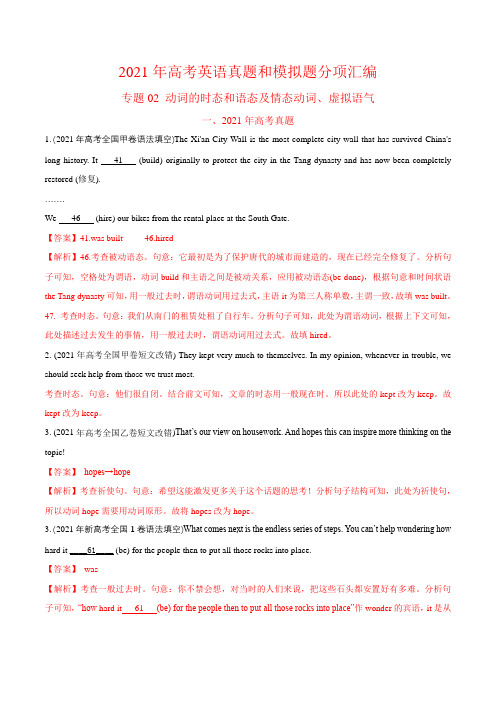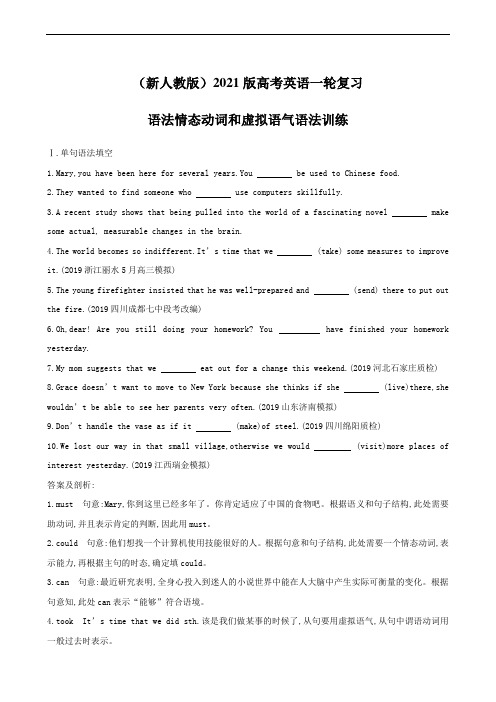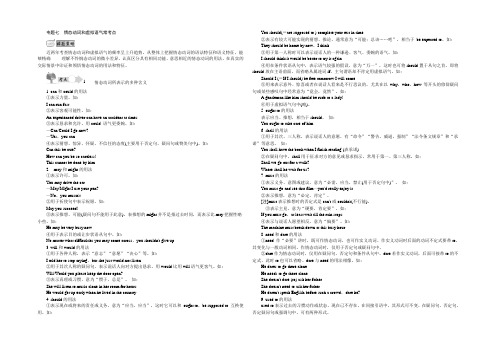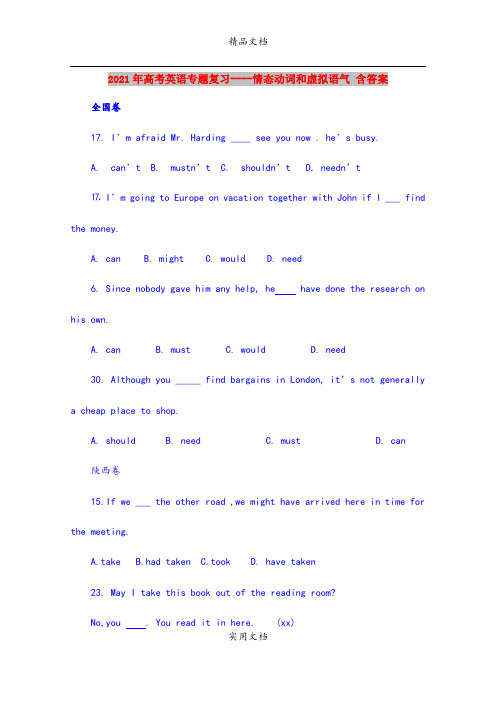2021年高考英语语法复习 情态动词和虚拟语气考点总结及配套练习
动词的时态和语态及情态动词、虚拟语气-2021年高考英语真题和模拟题分类训练(教师版含解析)

2021年高考英语真题和模拟题分项汇编专题02 动词的时态和语态及情态动词、虚拟语气一、2021年高考真题1. (2021年高考全国甲卷语法填空)The Xi'an City Wall is the most complete city wall that has survived China's long history. It ___41___ (build) originally to protect the city in the Tang dynasty and has now been completely restored (修复).…….We ___46___ (hire) our bikes from the rental place at the South Gate.【答案】41.was built 46.hired【解析】46.考查被动语态。
句意:它最初是为了保护唐代的城市而建造的,现在已经完全修复了。
分析句子可知,空格处为谓语,动词build和主语之间是被动关系,应用被动语态(be done),根据句意和时间状语the Tang dynasty可知,用一般过去时,谓语动词用过去式,主语it为第三人称单数,主谓一致,故填was built。
47.考查时态。
句意:我们从南门的租赁处租了自行车。
分析句子可知,此处为谓语动词,根据上下文可知,此处描述过去发生的事情,用一般过去时,谓语动词用过去式。
故填hired。
2.(2021年高考全国甲卷短文改错) They kept very much to themselves. In my opinion, whenever in trouble, we should seek help from those we trust most.考查时态。
句意:他们很自闭。
结合前文可知,文章的时态用一般现在时。
所以此处的kept改为keep。
2021年高考英语热点题型和提分秘籍专题08虚拟语气与情态动词含解析20211116229

专题08 虚拟语气与情态动词情态动词用来表示说话人的情绪、态度或语气,在情景交际和虚拟语气中取得普遍利用。
情态动词为中学英语考试大纲要求内容,而且是高考内容中的难点之一。
其主要考点主要集中在情态动词的大体意义及“情态动词+have done”结构的用法。
热点题型一情态动词的大体用法例一、[2021·北京卷] Samuel, the tallest boy in our class, ________ easily reach the books on the top shelf.A.must B.shouldC.can D.need【答案】C 【解析】考查情态动词。
can表示能力,意为“能够” 。
故答案为C。
句意:塞缪尔——咱们班个子最高的男孩——能够轻松地够到架子顶层上的书。
【变式探讨】—Can’t you stay a little longer?—It’s getting late.I really ________ go now.My daughter is home alone.A.may B.canC.must D.dare答案:C【提分秘籍】1.can和could的用法(1)表示“能力”。
(2)表示理论上的可能性,“有时候可能会”,用于肯定句中。
(3)表示礼貌地请求,意为“能,可以”。
could可代替can,表示委婉的语气。
(4)cannot...too/enough表示“无论……也不过度”;“越……越好……”。
No one can be compared with Yao Ming in playing basketball.在打篮球方面,无人能与姚明相媲美。
It is usually warm in my hometown in March,but it can berather cold sometimes.我的家乡三月份通常很暖和,但有时候也会相当冷。
You can’t be too careful while driving.开车时越小心越好。
【走向高考】2021高考英语 语法专题温习5 情态动词与虚拟语气试题精解(1)

语法专项(五) 情态动词与虚拟语气一、情态动词考点一can和could的用法1.表示惊讶,经常使用在否定句和疑问句中。
How could you do such a silly thing?你怎么能做那样的蠢事呢?2.表示可能性,意为“可能,有时会”。
can和could没有时态的不同,只是could不太确信。
Jogging can be harmful to the health.慢跑可能会对健康有害。
Accidents can/could h appen on such rainy days.如此的多雨天气可能会发生交通事故。
(客观的可能性)3.can用于否定句,意为“应该不是,不可能”。
I think it's all right. She can't make a mistake.我想应该没事,她不可能犯错误。
The story can't be true.那个故事不可能是真的。
4.cannot...too/enough表示“不管……也只是分”;“越……越好”。
You can't be too careful while driving.开车时越警惕越好。
You cannot remember enough English words.你记的英语单词越多越好。
5.cannot but+do sth.表示“不能不,只好”。
I couldn't but choose to go.我只好去。
[考题印证1](2021·安徽改编)It ________ be the vocabulary that caused you the problem in the exercise because you know a lot of words.不可能是辞汇致使了你练习中的问题,因为你明白很多的词。
解析:此题考查强调句和情态动词。
依照后半句“because you know a lot of words”,可知此处要用否定词,couldn't“不可能”。
(新人教版)2021版高考英语一轮复习 语法情态动词和虚拟语气语法训练(含答案)

(新人教版)2021版高考英语一轮复习语法情态动词和虚拟语气语法训练Ⅰ.单句语法填空1.Mary,you have been here for several years.You be used to Chinese food.2.They wanted to find someone who use computers skillfully.3.A recent study shows that being pulled into the world of a fascinating novel make some actual, measurable changes in the brain.4.The world becomes so indifferent.It’s time that we (take) some measures to improve it.(2019浙江丽水5月高三模拟)5.The young firefighter insisted that he was well-prepared and (send) there to put out the fire.(2019四川成都七中段考改编)6.Oh,dear! Are you still doing your homework? You have finished your homework yesterday.7.My mom suggests that we eat out for a change this weekend.(2019河北石家庄质检)8.Grace doesn’t want to move to New York because she thinks if she (live)there,she wouldn’t be able to see her parents very often.(2019山东济南模拟)9.Don’t handle the vase as if it (make)of steel.(2019四川绵阳质检)10.We lost our way in that small village,otherwise we would (visit)more places of interest yesterday.(2019江西瑞金模拟)答案及剖析:1.must 句意:Mary,你到这里已经多年了。
【最高考】2021高考英语(江苏)语法精讲+精练:专题七 情态动词和虚拟语气常考点

专题七情态动词和虚拟语气常考点近两年考查情态动词和虚拟语气的频率呈上升趋势。
从整体上把握情态动词的语法特征和语义特征,能够精确理解不怜悯态动词的微小差异,认真区分具有相同功能、意思相近的情态动词的用法,在真实的交际情景中印证和领悟情态动词的用法和特征。
1情态动词所表示的多种含义1. can和could的用法①表示力量。
如:I can run fast.②表示客观可能性。
如:An experienced driver can have an accident at times.③表示恳求和允许。
用could 语气更委婉。
如:—Can/Could I go now?—Yes,you can.④表示猜想、惊异、怀疑、不信任的态度(主要用于否定句、疑问句或赞美句中)。
如:Can this be true?How can you be so careless!This cannot be done by him.2. may和might的用法①表示许可。
如:You may drive the car.—May/Might I use your pen?—No,you mustn't.②用于祈使句中表示祝愿。
如:May you succeed!③表示推想、可能(疑问句不能用于此意)。
表推想的might并不是指过去时间,而表示比may把握性略小些。
如:He may be very busy now.④用于表示目的或让步状语从句中。
如:No matter what difficulties you may come across,you shouldn't give up.3. will和would的用法①用于各种人称,表示“意志”“意愿”“决心”等。
如:I told her to stop crying,but she just would not listen.②用于其次人称的疑问句,表示说话人向对方提出恳求。
高考英语情态动词和虚拟语气复习(完整版)

高考英语情态动词和虚拟语气复习【名师精讲必考语法,值得下载练习】情态动词是一种本身有一定的词义,后面加动词原形,给谓语动词增添情感色彩,表示说话人对有关行为或事物的态度和看法,认为其可能、应该或必要等。
一、情态动词的分类1.只做情态动词:must, can(could), may(might), ought to, should2.可做情态动词又可做实意动词:need, dare(dared)3.可做情态动词又可作助动词:shall, will(would)4.具有情态动词特征:have(had) to, used to, had better (not) do二、情态动词的特点1.情态动词没有人称和数的变化。
2. 情态动词后跟动词原形,否定式构成是在情态动词后面加“not”。
3. 情态动词属非及物动词,故没有被动语态。
三、情态动词的基本用法1.can/ could1) 表示能力Can you lift this heavy box?Mary can speak English fluently.此时可用be able to 代替。
can 只有一般现在时和一般过去式;而be able to 则有更多的时态。
I’ll be able to come this afternoon.注意:当表示“经过努力而成功做到某事时”不能用could, 而用was/were able to do= succeeded in doing= managedto doHe was able to go to the party yesterday in spite of the heavy rain.2) 表示可观可能性(客观原因形成的能力)。
译为“能够;可以”This hall can hold 500people at least.3) 某人或某物一时的可能性,常译为“有时(可能)会”It is usually warm in my hometown in March, but it can be rather cold sometimes.Little children can be very naughty.4) 表示请求和允许----- Can I go now?----- Yes, you can. No, you can’t.此时可与may 互换。
高考 情态动词和虚拟语气 知识点总结

情态动词和虚拟语气一、情态动词的用法要点1.表能力CanBe able to 表现在的能力Will be able to 表将来的能量力CouldWas/were able to 表过去的能力Could have + 过去分词表过去有能力但未做2.表推测(可能性)a.可能性分为客观的可能性和具体事情实际发生的可能性两种。
所谓客观的(理论的)可能性即并不涉及具体某事是否会发生,此种用法常常可以说明人或事物的特征情态动词can可用于肯定句中表示可观的(理论的)可能性,而表示具体事情实际发生的可能性时,can一般不用于肯定句。
b.表示具体事情实际发生的可能性①表示集体事情实际发生的可能性层次比较②表示具体事情实际发生的可能性时,may, must常用于肯定句,一般不用于否定句和疑问句(may not表示“可能不”);can常用于否定句、疑问句或感叹句中,表示疑惑、惊讶或不相信等意思;could既可用于肯定句又可用于否定句、疑问句中。
③would, could, should, might并不一定与过去时间有关,而表示可能性弱于他们相应的现在时形式④should表推测时,表示确定或可能有的未来或期望,即合乎理想的情况或结果3.表示请求、允许、允诺a.当对方是决策者时,你代表你(们)自己(I, we),或代表第三者(he, she, they)向对方(you)请示或提出建议时用:①shall/may(might)/can(could) I/we…?②shall he/she/they…?③would/will you…?b.Could/might/would/should表委婉语气c.Shall与第二、三人称连用用于陈述句,表示说话者的命令、警告、威胁;当宣布法律规定时,shall也由此用法4.表必要性a.must常用来表示必要性,以为“必须”①must + do sth. (现在或将来)必须做某事②don’t have to do sth./don’t need to do sth./needn’t do sth.(现在或将来)不必做某事③表示过去没必要做某事,分以下情况:Needn’t have done sth.本来不必做而做了某事Didn’t have to do sth./didn’t need to do sth./It was not necessary to so sth.(过去)不必做(不强调是否做了)某事b.should也可以表示必要性,意为“(义务上)应该”。
2021年高考英语专题复习----情态动词和虚拟语气 含答案

2021年高考英语专题复习----情态动词和虚拟语气含答案全国卷17. I’m afraid Mr. Harding ____ see you now . he’s busy.A. can’tB. mustn’tC. shouldn’tD. needn’t⒘ I’m going to Europe on vacation together with John if I ___ find the money.A. canB. mightC. wouldD. need6. Since nobody gave him any help, he have done the research on his own.A. canB. mustC. wouldD. need30. Although you _____ find bargains in London, it’s not generallya cheap place to shop.A. shouldB. needC. mustD. can陕西卷15.If we ___ the other road ,we might have arrived here in time for the meeting.A.takeB.had takenC.tookD. have taken23. May I take this book out of the reading room?No,you . You read it in here. (xx)A. mightn’tB. won’tC. need’tD.mustn’t22.I__________through that bitter period without your generous help.A. couldn’t have goneB. didn’t goC. wouldn’t goD.hadn’t gone24.—Will you read me a story ,Mummy? 2011--OK.You________have one if you go to bed as soon as possible.A. mightB. mustC. couldD. shall17. If may car _________more reliable, I would have driven to Lhasainstead of flying last summer.A. wasB. had beenC. should beD. would be23.I______ thank you too much for all your help to my son while we wereaway from home. xxA. won’tB. can’tC. canD. will12. My mom suggests that we eat out for a change this weekend.A. shouldB. mightC. couldD. would21. The children lost in the woods; otherwise, they would havebeen at the lakeside camp as scheduled. xxA. must have gotB. must getC. should have gotD. should get23. We would rather our daughter ________ at home with us, but it is her choice, and she is not a child any longer.A. would stayB. has stayedC. stayedD. stay25. My book, The House of Hales, is missing. Who ________ have taken it?A. needB. mustC. shouldD. could考点归纳虚拟语气If从句主从复合句(时间是过去)含蓄条件句(without)If从句主从复合句(时间是过去)表示含有建议命令要求的词用should+动词原形would rather (时间是现在)情态动词may的否定回答mustn’t shall表示允诺情态动词的特殊句型can’t ....too... 表示肯定推测must have done 情态动词疑问句的推测xx预测虚拟语气:It’s time从句as if 从句wish从句混合时间条件句If省略情态动词情态动词的特殊用法 can may must should shall will would情态动词的否定式情态动词一般用法 shall 情态动词完成式巩固练习1. When a pencil is partly in a glass of water, it looks as if it ______.A. breaksB. has brokenC. were brokenD. had been broken2. But for the help you gave me, I _______ the examinations.A. would have passedB. would passC. wouldn’t have passedD. wouldn’t pass3. I forget where I read the article, or I _____ it to you now.A. will showB. would showC. am going to showD. am showing4. ______ smoking, he would not have got cancer in the lung.A. Was he given upB. Had he given upC. Did he giveD. If he gave up5. “I still haven’t thanked Aunt Lucy for her present.” “It’s time you _____.”A. doB. didC. hadD. would6. It is hard for me to imagine what I would be doing today if I ____ in love, at the age of seven, with the Melinda Cox Library in my hometown.A. wouldn’t h ave fallenB. had not fallenC. should fallD. were to fall7. Look at the trouble I am in! If only I _____your dvice.A. followedB. would followC. had followedD. should follow8. After hours of repair, the driver tried to start the machine but it __________ work.A. won’tB. shouldn’tC. wouldn’tD. couldn’t9. He _________ another career, but at the time, he didn’t have enough money to attend graduate school.A. might chooseB. might have chosenC. had to chooseD. must have chosen10. He seldom listens to others. He_____answer for what he has done.A. shall B. will C. can D. would11 You can’t imagine that a well-behaved gentleman_______ be so rude to a lady .A. mightB. needC. shouldD. would12 Some aspects of a pilot’s job _____ be boring, and pilots often ____ work at inconvenient hours.A. can;have toB. may;canC. have to;mayD. ought to;must13. —When can I e for the photos? I need them tomorrow afternoon.—They _____ be ready by 12:00.A. canB. shouldC. mightD. need14. When he was there, he _____ go to that coffee shop at the corner after work every day.A. wouldB. shouldC. had betterD. might15. —Excuse me, but I want to use your puter to type a report.—You _____ have my puter if you don’t take care of it.A. shan’tB. might notC. needn’tD. shouldn’t16. —_____ he open the door?—Yes, please. A. Shall B. Will C. Can D. Would17 I certainly wish he _____ me how to sing English songs.A. teachesB. will teachC. has taughtD. would teach阅读练习BIn 1947 a group of famous people from the art world headed by an Austrian conductor decided to hold an intemational festival of music,dance and theatre in Edinburgh. The idea was to reunite Europe after the Second World War.At the same time, the “Fringe” appeared as a challenge to the official festival.Eight theatre groups turned up uninvited in 1947,in the belief that everyone should have the right to perform,and they did so in a public house disused for years.Soon,groups of studentsfirstly from Edinburgh University, and later from the universities of Oxford and Cambridge,Durham and Birmingham were making the journey to the Scottish capital each summer to perform theatre by little-known writers of plays in small church halls to the people of Edinburgh.Today the “Fringe”,once less recognized, has far outgrown the festival with around 1,500 performances of theatre,music and dance on every one of the 21 days it lasts. And yetas early as 1959,with only 19 theatregroups performing,some said it was getting too big.A paid administrator was first employed only in 1971, and today there are eight administrators working all year round and the number rises to 150 during August itself. In xx there were 200 places housing 1,695 shows by over 600 different groups from 50 different countries. More than 1,25 million tickets were sold.40. Point was the purpose of Edinburgh Festival at he beginning?A. To bring Europe together again.B. To honor heroes of World War 11.C. To introduce young theatre groups.D. To attract great artists from Europe.41. Why did some uninvited theatre groups e to Edinburgh in 1947?A. They owned a public house there.B. They came to take up a challenge.C. They thought they were also famous.D. They wanted to take part in the festival.42. Who joined the "Fringe" after it appeared?A.they owned a public house thereB. University students.C.人rusts from around the world.D. Performers of music anddance.43. We may learn from the text that Edinburgh Festival.A. has bee a non-official eventB. has gone beyond an art festivalC. gives shows all year roundD. keeps growing rapidly3 26063 65CF 族34546 86F2 蛲34185 8589 薉(40436 9DF4 鷴24446 5F7E 彾32399 7E8F 纏A30974 78FE 磾36948 9054 達A3。
- 1、下载文档前请自行甄别文档内容的完整性,平台不提供额外的编辑、内容补充、找答案等附加服务。
- 2、"仅部分预览"的文档,不可在线预览部分如存在完整性等问题,可反馈申请退款(可完整预览的文档不适用该条件!)。
- 3、如文档侵犯您的权益,请联系客服反馈,我们会尽快为您处理(人工客服工作时间:9:00-18:30)。
2021年高考英语语法复习情态动词和虚拟语气一、情态动词考点一情态动词的基本用法1.can和could的用法(1)表示“能力”。
The man can∕could speak two foreign languages.那个人能说两门外语。
(2)表示推测,一般用于疑问句和否定句。
—Can the news be true?——这个消息可能是真实的吗?—It can’t be true.——它不可能是真实的。
(3)表示可能性。
用于肯定句,常译为“往往会,常常会,有时候可能会”。
The weather in Ningbo can be very cold in winter.宁波的冬天会很冷。
(4)表示请示、允许。
口语中常用could代替can。
could用以委婉地提出请求等,但回答时必须用can。
Can I have a rest?我能休息一下吗?Could you please help fill this form?你能帮助我填下这个表格吗?(5)cannot...too∕enough表示“无论……也不过分”“越……越好”。
You can’t be too careful while driving.开车时越小心越好。
You cannot remember enough English words.你记的英语单词越多越好。
2.may和might的用法(1)表示许可。
might比may的语气更委婉。
You may use my bike.你可以用我的自行车。
(2)表示推测,意为“可能”。
may not表示一种不太确定的语气,意为“可能不”。
Some people who don’t like to talk much are not necessarily shy; they may just be quiet people.言语不多的人未必就是害羞;他们或许就是安静的人。
(3)may表示请求时,其否定式常用mustn’t表示“禁止”。
—May I use your car?——我可以用一下你的车吗?—No,you mustn’t.——不行。
(委婉拒绝可用:Sorry,but I’m using it now.或You’d better not.)(4)表示祝愿,常用结构为“May+主语+动词原形!”May you be happy every day!愿你快乐每一天!3.must(1)表示义务,意为“必须”(主观意志)。
We must do everything step by step.我们一切都必须循序渐进地做。
回答以must开头的问句时,若是否定回答,需要用 needn’t 或 don’t have to。
— Must we hand in our exercises today?——我们今天必须交练习吗?—Yes,you must.∕No,you needn’t∕you don’t have to.——是的,必须交。
∕不,不必今天交。
(2)表示推测,意为“一定,必定”,表达十分肯定的语气,只能用于肯定句中。
He must be ill.He looks so pale.他准是病了。
他脸色苍白。
(3)表示“非得,偏要”。
Must you play the piano in such late a time?你非要在这么晚的时间弹钢琴吗?4.shall和should的用法(1)shall①用于第二、三人称的陈述句中,表示命令、许诺、警告、强制、威胁等,此外,颁布法律、法规时也用shall。
You shall have a new bike for your birthday.你会得到一辆新自行车作为生日礼物。
The new law shall come into effect next month.新法将于下个月生效。
②用于第一、三人称的疑问句中,表示说话人征求对方的意见或向对方请示。
Shall the man standing outside have a try?让站在外边的那个人试试?(2)should①表示义务,常译为“应该”,用于各种人称。
Parents should take good care of their babies.父母应该照顾好他们的孩子。
②表示惊讶、意外等,常译为“竟然,居然”。
I am surprised that you should speak ill of me.我很惊讶,你竟然说我坏话。
5.will和would的用法(1)表示意愿,用于各种人称的陈述句中。
would常指过去的意愿。
If you want to read the book,I’ll give it to you.如果你想读这本书,我可以给你。
(2)表示请求,用于疑问句。
would语气较委婉。
Will you close the window?请你关上窗户好吗?(3)表示某种倾向或习惯性动作,常译为“总是,习惯于”。
would可表示过去反复发生的动作或某种倾向,后面接表示动作的动词,不能接表示状态的词。
Every morning he will have a walk along the river.每天早晨,他总是沿着小河散步。
used to表示过去的习惯动作或状态,强调现在已不存在。
The old woman would sit in front of the door,watching the people go by.那个老太太总是坐在门前,看着人们走过。
It used to be a factory,but now it is a big supermarket.它过去曾经是一个工厂,但是,现在它已经是一个很大的超市了。
6.need和dare的用法need和dare既可用作情态动词,也可用作实义动词。
用作情态动词时,主要用于否定句和疑问句。
—Need I come?——我需要来吗?—Yes,you must.——是的,你必须来。
You needn’t telephone him now.你现在不必打电话给他。
She dare not go out alone at night.她晚上不敢一个人出去。
考点二“情态动词+have done”的用法1.对过去发生的事情或状态进行推测Since nobody gave him any help,he must have done the research on his own.既然没有人帮助他,他一定是独自做的研究。
Could he have left the work unfinished?他会丢下工作不干了?2.表示“与过去事实相反”I could have done better in the last exam.上次考试我本应该考得更好。
You needn’t have watered the flowers because it would rain soon.你本不必浇花的,因为很快会下雨的。
(已经浇了)I would have helped you but I was busy at that time.我本来想帮你可是当时很忙。
(没有帮)二、虚拟语气1.非真实条件句中虚拟语气的用法If I were you,I would go with him.如果我是你,我就和他一起去。
If you had studied harder last term,you could have passed the exam.如果上学期你学习更努力的话,你考试就会及格了。
If it snowed tomorrow,we would take photos.如果明天下雪,我们就照相。
条件句中有were,had或should时,如果省略if,则需把were,had或should放在主语前,构成倒装结构。
如:If I were in your position,I would do the same.→Were I in your position,I would do the same.假如我处在你的位置,我也会这样干的。
If you had come earlier,you would have caught the bus.→Had you come earlier,you would have caught the bus.如果你来得早些,你就会赶上公共汽车了。
If it should rain tomorrow,we would not go climbing.→Should it rain tomorrow,we would not go climbing.如果明天下雨的话,我们就不去爬山了。
2.错综时间虚拟条件句当从句谓语动词与主句谓语动词所发生的时间不一致时,它们的形式要根据各自所表示的时间作出相应的调整。
If you had worked hard,you would pass the exam this time.(从句指过去,主句指现在) 如果你之前努力学习的话,你就会通过这次考试了。
3.含蓄虚拟语气有时,假设的情况并不用条件从句表达,而是暗含在上下文中,由otherwise,but,or,without,but for 等组成的词组来表达。
But for your help,we couldn’t have succeeded.(介词短语)要不是你的帮助,我们是不会成功的。
Without electricity,life would be quite different today.(介词)如果没有电,今天的生活就会完全不同。
I was ill that day.Otherwise,I would have taken part in the sports meeting.(副词) 我那天病了。
否则,我就参加运动会了。
He telephoned to inform me of your birthday,or I would have known nothing about it.(连词)他打电话通知了我你的生日,否则,我对此一无所知。
4.某些从句中虚拟语气的用法(1)用于表示建议、愿望、命令等动词后的宾语从句中。
常见的动词有:demand,order,require,insist,suggest,advise,request,urge,command,recommend等。
宾语从句中的虚拟语气结构为“should+动词原形”,should 可以省略。
[记忆口诀]一主张:insist二命令:order,command三建议:suggest,advise,recommend四要求:request,require,ask,demand外加一个敦促:urgeThe school recommends parents not permit their children to swim in rivers or lakes during summer holidays.学校建议父母们在暑假期间不要让自己的小孩在河里或湖里游泳。
